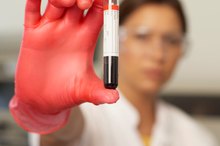What does fact checked mean?
At Healthfully, we strive to deliver objective content that is accurate and up-to-date. Our team periodically reviews articles in order to ensure content quality. The sources cited below consist of evidence from peer-reviewed journals, prominent medical organizations, academic associations, and government data.
- Centers for Disease Control and Prevention: Nutrition for Everyone: Basics: Iron and Iron Deficiency
The information contained on this site is for informational purposes only, and should not be used as a substitute for the advice of a professional health care provider. Please check with the appropriate physician regarding health questions and concerns. Although we strive to deliver accurate and up-to-date information, no guarantee to that effect is made.
What Vitamins & Minerals Do Eyebrow Hairs Need to Grow?
The hair on your eyebrows grows in the same manner as the hair on your head and your other body hair. All body hair needs the same nutrients to grow. If your diet regularly lacks nutrients that are critical to growing healthy hair, you’ll notice decreased hair growth all over, not just on your eyebrows.
B Vitamins
B vitamins are vital for all living cells and tissues, including your hair 1. There are a few B vitamins in particular -- vitamin B-1, vitamin B-2 and biotin -- that are crucial for hair growth 1. B vitamins are readily accessible in dairy products, whole grains, vegetables, fruits and meats. A vitamin B deficiency is rare because B vitamins are easily obtained from many different foods.
Iron
Healthy Hair Growth in Women After Menopause
Learn More
Your hair relies on blood to carry oxygen and nutrients. Iron is the nutrient that’s responsible for making that happen. Without iron, your blood cells cannot efficiently deliver oxygen and nutrients to hair follicles and other tissues. You can obtain all the iron your body needs by eating eggs, leafy green vegetables, meat and fruits. Iron deficiency is the most common nutritional deficiency in the U.S., according to the Centers for Disease Control.
- Your hair relies on blood to carry oxygen and nutrients.
- Without iron, your blood cells cannot efficiently deliver oxygen and nutrients to hair follicles and other tissues.
Protein
Hair strands are made of a protein called keratin. Protein is necessary for healthy hair growth. Vegetarians, those who have an eating disorder like anorexia, or people who follow restricted diets are at the highest risk for not getting an adequate amount of protein. Meat can provide an adequate source of protein, but so can beans, nuts and legumes.
- Hair strands are made of a protein called keratin.
- Vegetarians, those who have an eating disorder like anorexia, or people who follow restricted diets are at the highest risk for not getting an adequate amount of protein.
Sulfur
Minerals for Fingernails and Fine Hair
Learn More
Sulfur works directly with protein and aids in its function. Sulfur can be obtained by eating foods rich in protein. Harvard Health Publications states that there’s no recommended daily allowance of sulfur and that sulfur deficiencies are rare. As long as you consume an adequate amount of protein, you shouldn’t have to worry about your sulfur levels.
- Sulfur works directly with protein and aids in its function.
- Harvard Health Publications states that there’s no recommended daily allowance of sulfur and that sulfur deficiencies are rare.
Related Articles
References
- University of Maryland Medical Center: Vitamin H (Biotin)
- Phillips TG, Slomiany WP, Allison R. Hair Loss: Common Causes and Treatment. Am Fam Physician. 2017;96(6):371-378.
- Watras MM, Patel JP, Arya R. Traditional anticoagulants and hair loss: a role for direct oral anticoagulants? A review of the literature. Drugs Real World Outcomes. 2016;3(1):1-6. doi:10.1007/s40801-015-0056-z
- Urysiak-czubatka I, Kmieć ML, Broniarczyk-dyła G. Assessment of the usefulness of dihydrotestosterone in the diagnostics of patients with androgenetic alopecia. Postepy Dermatol Alergol. 2014;31(4):207-15. doi:10.5114/pdia.2014.40925
- Vincent M, Yogiraj K. A descriptive study of alopecia patterns and their relation to thyroid dysfunction. Int J Trichology. 2013;5(1):57-60. doi:10.4103/0974-7753.114701
- Peters EMJ, Müller Y, Snaga W, et al. Hair and stress: A pilot study of hair and cytokine balance alteration in healthy young women under major exam stress. PLoS ONE. 2017;12(4):e0175904. doi:10.1371/journal.pone.0175904
- Pratt CH, King LE, Messenger AG, Christiano AM, Sundberg JP. Alopecia areata. Nat Rev Dis Primers. 2017;3:17011. doi:10.1038/nrdp.2017.11
- American Academy of Dermatology. Alopecia Areata: Overview.
Writer Bio
Derek Buckner has been writing professionally since 2005, specializing in diet, nutrition and general health. He has been published in "Today's Dietitian," "Food Essentials" and "Eating Well Magazine," among others. Buckner is a registered dietitian and holds a Bachelor of Science in nutrition and food science from Drexel University.









